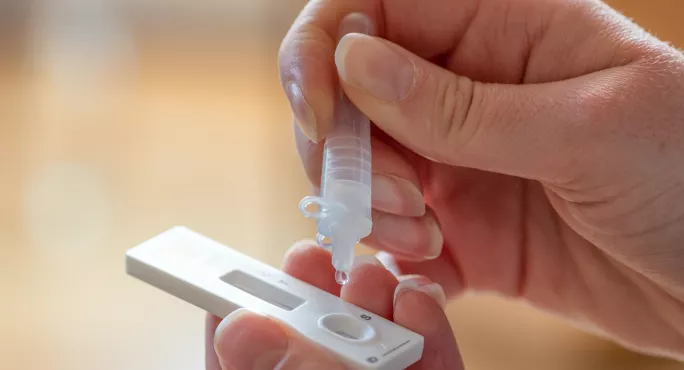Covid: Schools can turn away pupils with symptoms

Schools should make their own decisions about whether to turn away children with Covid symptoms when parents “insist” they attend, according to new government guidance.
New guidance for parents, published by the Department for Education today, says that schools can turn away children who attend school with Covid symptoms, if in their “reasonable judgement” it is necessary to protect other pupils and staff from possible infection.
Since yesterday, there has been no legal requirement to self-isolate after a positive Covid test, though pupils and staff who test positive are advised to remain at home for at least five full days and then continue to follow the guidance until they have received two negative test results on consecutive days.
- End of Covid rules: What schools need to know
- Unions: Ending Covid rules risks school chaos, PM warned
- Omicron: Primary schools tighten Covid rules as cases soar
Prime minister Boris Johnson said earlier this week that the changes to Covid rules were part of moving from “government restrictions” to “personal responsibility”.
Guidance published by the DfE today reads: “If you insist on your child attending nursery, school or college when they have symptoms, they can take the decision to refuse your child if, in their reasonable judgement, it is necessary to protect other pupils and staff from possible infection with Covid 19.”
The removal of Covid rules in schools
It continues: “Their decision would need to be carefully considered in light of all the circumstances and current public health advice.”
Paul Whiteman, general secretary of school leaders’ union the NAHT, said he expected that “the vast majority of families” would follow the updated guidance and keep their child off school if they had Covid.
He added: “Overall, schools and families have worked closely together to keep everyone safe and protected. The updated guidance from government is clear that school leaders do have the right to refuse to allow a child to attend school if they have Covid symptoms, if necessary.
“We would hope that most schools do not need to resort to taking such steps, but it is helpful to have clarity on this, in case it is needed.”
Geoff Barton, general secretary of the Association of School and College Leaders, said: “We have written to members today highlighting UKHSA [UK Health Security Agency] guidance as well as operational guidance to education settings.
“The UKHSA guidance is clear that, while there is no longer a legal requirement for people with Covid to self-isolate, if you have any of the main symptoms of Covid or a positive test result, the public health advice is to stay at home and avoid contact with other people.”
He added that the DfE’s operational guidance “appears clear that schools and colleges should have robust policies in place that anyone with Covid symptoms should be asked to stay at home and take a PCR test, and that anyone with a positive test should be required to stay at home for 10 days or until they test negative for two consecutive days from day five, whichever is the sooner”.
However, an epidemiologist and member of the Independent SAGE group of scientists has warned that the new approach means heads have been once more “hung out to dry”.
Speaking about the guidance, in a session on educational policy during the pandemic earlier today, Dr Deepti Gurdasani, a senior lecturer and clinical epidemiologist at Queen Mary University of London, said that headteachers had been “hung out to dry” throughout the pandemic, and that the latest guidance was “no exception”.
She said: “I have great sympathy with headteachers because they essentially have been hung out to dry for the last two years. This is no exception.”
You need a Tes subscription to read this article
Subscribe now to read this article and get other subscriber-only content:
- Unlimited access to all Tes magazine content
- Exclusive subscriber-only stories
- Award-winning email newsletters
Already a subscriber? Log in
You need a subscription to read this article
Subscribe now to read this article and get other subscriber-only content, including:
- Unlimited access to all Tes magazine content
- Exclusive subscriber-only stories
- Award-winning email newsletters
topics in this article



